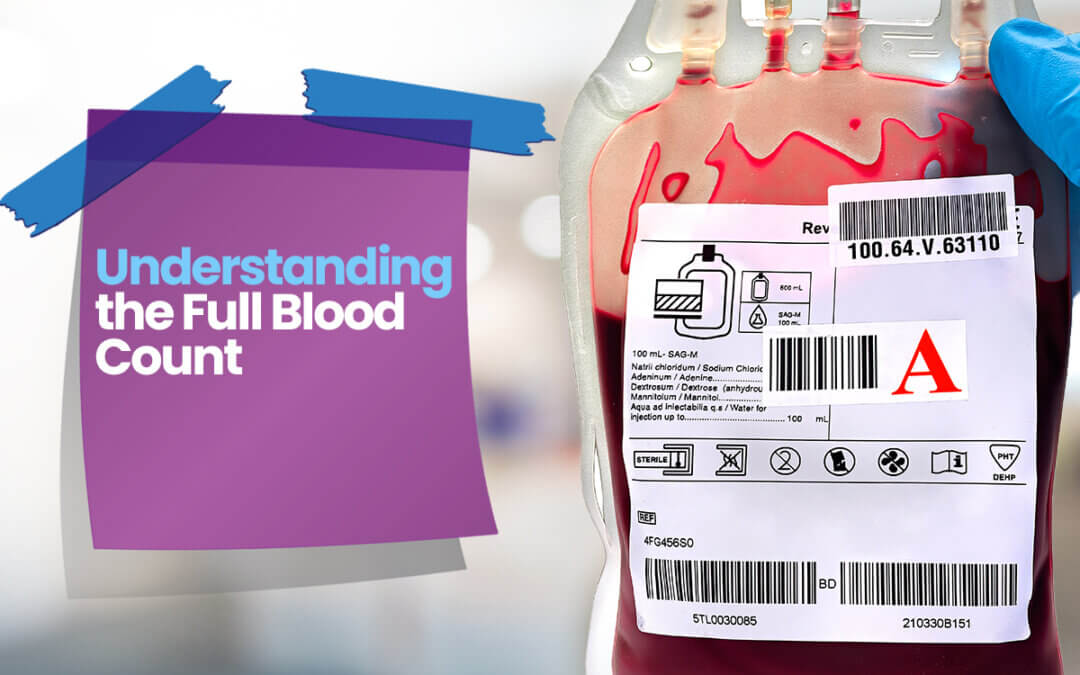Share this blog post with your friends
In this article, we’ll delve into the importance of a full blood count or complete blood count, also known as a complete blood count (CBC). By understanding what a full blood count or complete blood count involves and why it’s such a crucial diagnostic tool, you can take charge of your health and make well-informed decisions about your well-being.
What is a full/complete blood count?
A full blood count or complete blood count also called a complete blood count (CBC), is a common test that gives important information about your blood. It helps doctors understand how healthy your blood is and can help diagnose different health conditions.
During this test, the doctor takes a small sample of your blood and checks different parts of it. They look at your red blood cells, which carry oxygen in your body, and see if there are enough of them. They also check your white blood cells, which help fight off infections. The doctor wants to make sure you have the right amount and types of white blood cells. Lastly, they look at your platelets, which help your blood clot to stop bleeding. The doctor checks to see if you have enough platelets.
The full blood count or complete blood count can also measure other things, like the size of your red blood cells and the amount of hemoglobin, which carries oxygen in your blood.
By looking at the results of this test, the doctor can tell if you have any health problems. It can show if you have anaemia, which means you don’t have enough red blood cells. It can also indicate if you have an infection or if your body is fighting off an illness. The test helps check your overall health and monitor any conditions you may have.
The Importance Of Full/Complete Blood Count
- Checking red blood cells: This test looks at your red blood cells, which carry oxygen throughout your body. It ensures that you have enough red blood cells to keep you healthy and energized.
- Assessing white blood cells: White blood cells are your body’s defence system. The Full blood count checks if we have enough of them to fight off germs and keep us from getting sick.
- Monitoring platelets: Platelets are important for blood clotting. The Full blood count ensures we have enough platelets to stop bleeding when we have cuts or injuries.
- Detecting health issues: By analyzing the results of the Full blood count, doctors can identify any abnormalities in our blood. It can reveal conditions like anaemia (low red blood cell count) or signs of infection or illness.
- Overall health evaluation: A comprehensive blood count provides important information about our general health. It assists doctors in monitoring our health and detecting any underlying health issues.
Types of Full/Complete Blood Count
We have several types of blood tests that can provide a comprehensive assessment of one’s health, here are some of them:
Complete Blood Count (CBC)
This test determines the concentrations of several components in our blood as we explained earlier. It informs us about our overall blood health and aids in the detection of problems such as anaemia, infections, and blood disorders.
Here are some benefits of taking a Complete blood count CBC test:
-
- Disease Detection: The CBC can assist in the detection of a variety of medical problems, including infections, anaemia, leukaemia, and immune system disorders. It aids in the diagnosis and monitoring of these disorders by evaluating the levels of certain blood cells.
- Treatment Evaluation: For individuals undergoing medical treatments, such as chemotherapy or medication for certain diseases, CBCs are crucial for monitoring the effects of treatment on blood cell counts. It helps healthcare providers adjust treatment plans accordingly.
- Health Monitoring: Regular CBCs can be used as a baseline for tracking an individual’s health over time. Doctors can track changes or trends in blood cell counts by comparing findings from earlier tests, which may suggest the progression or improvement of certain illnesses.
Comprehensive Metabolic Panel (CMP)
The CMP is a comprehensive tool for evaluating metabolic health, and organ function and identifying potential abnormalities. It is frequently utilized in routine check-ups, preoperative evaluations, and the monitoring of specific medical problems. CMP results should be interpreted in cooperation with a healthcare practitioner who can provide specific advice based on particular health needs.
Here are some benefits of taking a comprehensive metabolic panel test:
- Monitoring Chronic Conditions: For individuals with chronic conditions like diabetes, kidney disease, or liver disease, regular CMP testing helps monitor their ongoing health status. By tracking changes in markers over time, healthcare providers can adjust treatment plans and ensure optimal management.
- Personalized Healthcare: CMP results provide useful information that can be used to influence individualized healthcare decisions. Healthcare practitioners can adjust treatments, drugs, and lifestyle recommendations to individual requirements and goals by understanding a person’s distinct metabolic profile.
- Preventive Care: The CMP serves as a preventive tool by identifying potential health risks before they manifest as symptoms. It allows healthcare providers to take proactive measures to prevent or manage conditions more effectively, promoting long-term health and well-being.
Lipid Profile
This test detects the presence of several forms of cholesterol and lipids in our blood. It determines our chance of developing cardiovascular disorders such as heart attack and stroke.
Here are some benefits of taking a Lipid Profile test:
- Assessing Cardiovascular Risk: The Lipid Profile Test helps evaluate an individual’s risk of developing cardiovascular diseases, such as heart disease and stroke. It measures cholesterol levels, including total cholesterol, LDL cholesterol (often referred to as “bad” cholesterol), HDL cholesterol (often referred to as “good” cholesterol), and triglycerides. Abnormal lipid levels can indicate an increased risk of cardiovascular problems.
- Monitoring Cholesterol Levels: The test allows for continuous monitoring of cholesterol levels. This is especially crucial for people who have high cholesterol or are on cholesterol-lowering medication. Regular Lipid Profile Tests aid in determining the efficacy of measures, such as lifestyle changes or drugs, in controlling cholesterol levels.
- Dyslipidemia Early Detection: Dyslipidemia refers to abnormal lipid levels that can contribute to the development of cardiovascular illnesses. The Lipid Profile Test aids in detecting dyslipidemia early, allowing for appropriate intervention and lifestyle changes to avoid or manage these disorders.
Liver Function Test (LFT)
This test assesses the liver’s function by assessing the amounts of enzymes, proteins, and other chemicals in the blood. It aids in the detection of liver disorders or situations such as hepatitis and liver damage.
Here are some benefits of taking a Liver function test:
- Assessing Liver Health: The LFT helps evaluate the overall health of the liver by measuring various enzymes, proteins, and other substances in the blood. It provides insights into liver function, including its ability to metabolize drugs, produce proteins, and eliminate toxins from the body.
- Evaluating Drug Toxicity: The LFT is used to test liver function before prescribing certain medications, as some drugs can induce liver damage or toxicity. Monitoring liver enzymes with LFTs aids in the identification of potential drug-induced liver impairment and allows healthcare providers to make informed decisions about medication selection and dosage.
- Preoperative Evaluation: A Liver Function Test may be conducted before surgery to examine liver function and identify any underlying liver disorders that may impair the surgical procedure or recovery process. It guarantees that the liver can withstand the physiological stress of surgery.
Kidney Function Test
The Kidney Function Test, commonly known as the Renal Function Test, is an important tool for monitoring kidney health and function. It gives useful information on kidney function and aids in the early detection and management of kidney-related diseases. The following are some of the benefits of the Kidney Function Test:
- Monitoring Kidney Health: Regular Kidney Function Tests are essential for monitoring kidney function in those with known renal disorders or those at risk of kidney disease. These tests monitor changes in kidney function over time, allowing healthcare providers to detect disease progression, evaluate therapy efficacy, and make required drug or lifestyle changes.
- Assessing Fluid and Electrolyte Balance: The Kidney Function Test measures levels of electrolytes such as sodium, potassium, and chloride, as well as markers of fluid balance like creatinine and blood urea nitrogen (BUN). These parameters provide insights into the body’s fluid and electrolyte status and help identify any imbalances that could be indicative of kidney dysfunction.
- Evaluating Medication Safety: The kidneys are responsible for filtering and removing waste products from the body, including pharmaceuticals. The Kidney Function Test assists healthcare providers in determining the kidney’s ability to eliminate medicines and metabolites. This information is critical in calculating proper medication dosages and preventing potential drug toxicity or side effects caused by reduced renal function.
Thyroid Function Test
The Thyroid Function Test is an important tool for determining the health and function of the thyroid gland. It evaluates thyroid hormone levels and provides insights into thyroid function by measuring several indicators in the blood. The following are some of the benefits of the Thyroid Function Test:
- Detecting Thyroid Disorders: The Thyroid Function Test helps identify thyroid disorders such as hypothyroidism (low thyroid hormone levels) and hyperthyroidism (high thyroid hormone levels). It assesses the levels of thyroid-stimulating hormone (TSH), triiodothyronine (T3), and thyroxine (T4) to determine if the thyroid gland is functioning properly.
- Managing Hypothyroidism: For individuals diagnosed with hypothyroidism, the Thyroid Function Test is essential for monitoring thyroid hormone levels and ensuring that the prescribed medication (thyroid hormone replacement therapy) is effectively managing the condition. Regular testing helps healthcare providers adjust medication dosages as needed to maintain optimal hormone levels.
- Identifying Autoimmune Thyroid Conditions: The Thyroid Function Test aids in the diagnosis of autoimmune thyroid conditions such as Hashimoto’s thyroiditis and Graves’ disease. These conditions result from an abnormal immune response that affects thyroid function. Timely diagnosis allows for appropriate management and treatment.
Blood Glucose Test
The Blood Glucose Test is a valuable tool used to measure the levels of glucose (sugar) in the blood. It plays a crucial role in assessing and managing various health conditions, particularly diabetes. Here are some of the benefits of Blood Glucose Test:
- Assessing Glycemic Control: For individuals with diabetes, the Blood Glucose Test provides a snapshot of their current glycemic control. By monitoring blood sugar levels over time, healthcare providers can evaluate the effectiveness of diabetes management strategies and make necessary adjustments to medication or lifestyle recommendations.
- Management of Hypoglycemia: The Blood Glucose Test is very important for detecting low blood sugar levels (hypoglycemia). This is especially crucial for diabetics who use insulin or other drugs that might drop blood sugar levels. Regular testing enables for early detection and treatment of severe hypoglycemia episodes.
- Pregnancy Monitoring: Pregnant women can get a Blood Glucose Test to check their blood sugar levels and screen for gestational diabetes. Gestational diabetes can develop during pregnancy and may necessitate dietary modifications, exercise, or medication to control blood sugar levels and maintain the mother and baby’s health.
We have other types of full/complete blood tests such as:
- Red Blood Cell Count (RBC Count)
- White Blood Cell Count (WBC Count)
- Hemoglobin (Hb) Test
- Hematocrit (Hct) Test
- Platelet Count (Plt Count)
- Mean Corpuscular Volume (MCV)
- Mean Corpuscular Hemoglobin (MCH)
- Mean Corpuscular Hemoglobin Concentration (MCHC)
- Red Cell Distribution Width (RDW)
- Differential White Blood Cell Count
When these tests are performed together, they provide a comprehensive review of the various components of blood and help healthcare professionals diagnose and monitor a wide range of disorders. Remember to speak with your healthcare practitioner if you have any questions about your specific test results or their implications for your health. Consult with us at synlab to determine the optimum frequency of testing based on your health profile and any specific concerns you may have.

